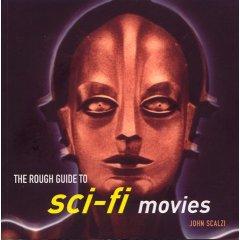
The brilliantly entertaining science fiction writer John Scalzi has just released his nonfiction work The Rough Guide to Sci-Fi Movies, and, like many books of that type, he's included his own best-of list or "Canon," a list of the 50 SF movies you must see before you die. This list is already circulating around the blogosphere, with everyone taking the predictable hits: "Why is [X] on there and not [Y]?"
Naturally I have my own critiques — 28 Days Later? I thinketh notteth — but overall the list seems fairly sound, and the book looks entertaining and quite thorough in its analysis of the history of SF in film. Can't wait to get my copy.
"Best of All Time" lists are a common critical tradition, and the tradition raises the question of why such lists ought to be prepared in the first place — as art is all a matter of taste, right? Sure, to a certain extent. But art never exists in a vacuum. The fact that not everything appeals to everyone's tastes is kind of beside the main point, which is that in every artistic field, there come certain examples of work that just plain make history. Either they just hit at the right time; or they strike a chord with the public and develop an enduring appeal; or, filmmakers, critics and academics can analyze them for revolutionary use of technique that goes on to influence later generations.
This is why you keep seeing many of the same movies like Citizen Kane, Casablanca, and Gone with the Wind popping up on lists like the AFI Top 100. They are, of course, widely beloved, but not by everyone. The den of your average doublewide is more likely to be inhabited by dudes drinking light beer and chortling to Happy Gilmore than by chaps in tweed furrowing their brows and gnawing their pipe stems over the existential angst of Through a Glass Darkly. But what's more important than these films' popularity is their enduring legacy of shaping the way films were made for years afterward. Influence, innovation, and artistry are more relevant than popularity when establishing a canon. A canon is not a "my favorites" list, it's a "most important to the art form" list. And a wise person will recognize when a work of art is important to history even if it's not their personal cup of tea.
So this is why, for instance, if I were coming up with a horror movie "canon," I'd have to add something like The Blair Witch Project, though I don't think much of it as a movie myself. Its importance in legitimizing indie film (to whatever small degree) and its influence upon microbudget digital filmmakers everywhere is indisputable. (Also, a horror canon would have to include The Exorcist, a movie I personally find silly, boring, and atrociously written, but whose status as a cultural bellwether one would have to be a fool to deny.)
Finally, the relevance of best-of-all-time lists is that, even if it's only to a very abstract degree, they give artists a consensus standard of excellence to aspire towards. I don't think anyone today (except a few pretentious wankers who shalt remain nameless) makes films with the explicit hope of ending up on such a list years hence. But show me a director — outside of, naturally, the obvious schlockosphere trolled by the likes of, say, Troma — who wouldn't smile at the thought that, someday, in fifty or 100 years, their movie is being taught at universities alongside the work of Welles, Scorsese, Fellini, and others, and I'll show you a lying liar.
No comments:
Post a Comment